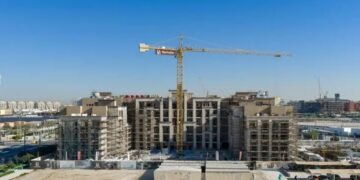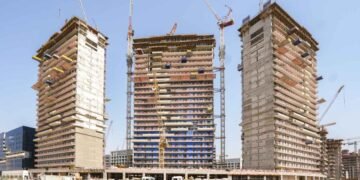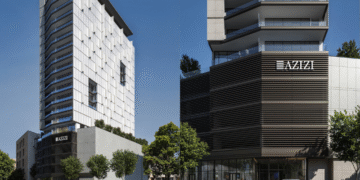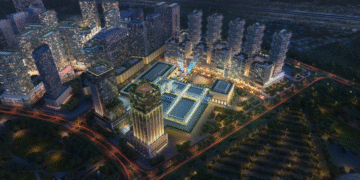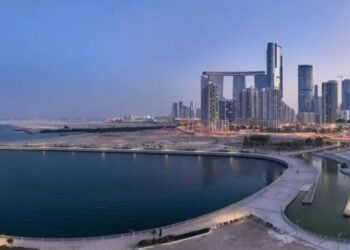DUBAI, Aug 13, 2025: In a bid to accelerate project delivery and maximize profitability, a growing number of leading UAE developers are establishing in-house contracting divisions, moving away from long-standing reliance on third-party construction firms, as reported by Reuters.
The shift aims to strengthen control over timelines, costs, and quality standards, while securing a larger share of profits in Dubai’s thriving property sector. However, industry experts caution that the strategy also carries operational and financial risks.
Emaar, Samana, Azizi Among Developers Leading the Shift
Emaar Properties — the developer behind the Burj Khalifa — has launched Rukn Mirage under its subsidiary Mirage, according to a company spokesperson. The move follows similar initiatives from Samana Developers, Ellington Properties, and Azizi Developments, all of which have introduced in-house contracting arms over the past two years.
Also read: Can NRIs Get Home Loans in Dubai? A Guide for Indian Buyers
Arada, co-founded by Saudi Prince Khaled bin Alwaleed bin Talal Al Saud, has also acquired part of an Australian contractor this year, with plans to integrate operations into the UAE market by 2027.
A sector table compiled by Reuters lists Emaar, Samana, Azizi, Ellington, and Sobha alongside their contracting units, with launch dates ranging from 2016 to 2025.
Market Boom Driving Change
Dubai’s real estate market has surged in recent years, with property prices climbing 70% over four years to December 2024. The government’s ambitious plan to double the city’s population to 7.8 million by 2040 is fueling the demand for residential and commercial developments.
Property launches rose by 83% in 2024, even as completions dropped 23%, according to industry data. This supply gap, coupled with reduced competition among independent contractors, is prompting developers to take more control.
Also read: Off-Plan vs Ready Properties in Dubai: What Works Best for Indian Buyers?
Samana Developers initially allocated 20% of projects to its internal arm after launching in September but now handles 80–90% of its new developments in-house.
“We used to get 25 or 30 contractors bidding for a project. Today, you get hardly two or three,” said Samana CEO Imran Farooq.
Emaar is adopting a hybrid model — executing certain projects through Rukn Mirage while continuing to outsource others.
Financial Strategies and Escrow Constraints
Developers are also tapping debt markets to fund land acquisitions and operations. Buyer payments, held in escrow until final inspections, can only be released after handover, with a one-year grace period before refund claims are allowed.
According to market charts, cash held in escrow by top developers — including Emaar, Sobha, Aldar, Damac, Binghatti, and Omniyat — has risen steadily from 2022 to 2024, with Emaar and Damac holding the largest amounts.
Timely completion is critical for unlocking these funds, distributing shareholder returns, and supporting expansion both locally and internationally. Delays can result in legal and financial penalties, such as a March ruling ordering a developer to repay AED 12.4 million plus interest over an undelivered floating villa.
Risks of Bringing Construction In-House
While vertically integrating the construction process provides more certainty, it also stretches developers’ operational focus.
“When developers try to become builders, they start splitting focus — and that’s when things can get muddy,” said Gordon Rodger, founder and managing partner at Stonehaven, a UAE-based construction consultancy.
He warned that developers could be left with idle capacity in a downturn. “You’ve got a pre-cast yard, joinery division, in-house equipment all sitting idle because your master developer can’t sell,” Rodger explained.
Independent contractors may increasingly turn to government infrastructure, manufacturing, or oil and gas projects to offset reduced real estate opportunities.
Implications for Indian Investors in Dubai Real Estate
For Indian investors — who have historically been among the largest foreign buyers in Dubai’s property market — the trend towards in-house contracting could offer both benefits and considerations.
On the positive side, greater control over construction timelines may reduce delivery delays, making investment in under-construction projects less risky. This is particularly relevant for Indian buyers seeking stable rental yields and timely handovers for long-term capital appreciation.
However, investors should monitor the financial health of developers adopting this model. In-house contracting can create higher fixed costs, which may impact developer liquidity during market slowdowns. For risk mitigation, Indian investors might consider projects from developers with hybrid approaches, combining in-house capabilities with selective outsourcing.
Discover more from Invest Dubai Today - Dubai Realty Insights
Subscribe to get the latest posts sent to your email.








